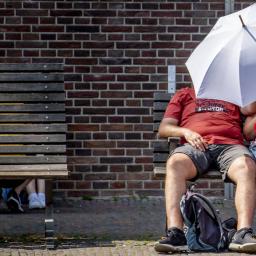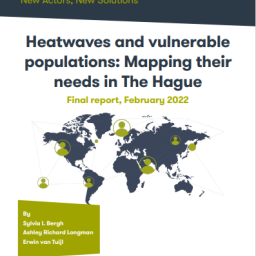The applied research project entitled ‘The Effect of heatwaves on vulnerable population groups in The Hague’ mapped the needs of independently living seniors in order to adapt to heatwaves, the sustainable (frugal) solutions that exist, and the actions that the municipality could take to address these needs and thereby contribute to urban resilience. To do so, the project team conducted surveys and Focus Group Discussions with senior citizens, and interviews with representatives of the private sector, care organisations, housing corporations and policy makers.
Summer in the City - The Hague
Heatwaves: a wicked problem
Heatwaves constitute an important yet often overlooked part of climate change and their impacts qualify as disasters. Periods of tropical days and nights are getting longer and most importantly, this trend is accelerating faster than climate change models are predicting. In the Netherlands, the summer of 2020 became a new record year as it was the first time that a heatwave included five days in a row during which the temperature reached 35 degrees or more and for the first time 40 degrees were measured. This summer we are feeling the heat again with scorching temperatures stretching across Europe. In the Netherlands alone, it reached 40 degrees Celsius again.
Periods of tropical days and nights are getting longer and most importantly, this trend is accelerating faster than climate change models are predicting.
Heatwaves are increasingly recognized as a multi-dimensional, multi-stakeholder, and multi-level governance problem, both by scholars and policy-makers. First, multi-dimensionality refers to the distinction between heat mitigation and adaptation. Mitigation means making the city less prone to the hazard which includes land use planning, infrastructure, housing, greens, etc. Adaptation on the other hand refers to measures to help vulnerable people to cope with the hazard, and this includes social work, public health, early warning, community initiatives etc. Second, relevant stakeholders include local governments, the construction sector, housing corporations, public health services, and of course, the local population, especially vulnerable groups. And third, the various governance levels consist of the global (e.g. WHO, UN SDGs, Paris agreement), EU (EU Green Deal), as well as national and sub-national (municipal, local) levels.
Heatwaves and negative interaction effects
Dr. Sylvia Bergh, researcher at The Centre of Expertise on Global Governance at The Hague University of Applied Sciences and lead applicant in this project, explains that the research focused on adaptation at the local level and the relevant stakeholders involved in The Hague. At the level of municipalities and cities, the concept of urban resilience is key. It refers to ‘the capacity of individuals, communities, institutions, businesses, and systems within a city to survive, adapt, and grow no matter what kinds of chronic stresses and acute shocks they experience.’ Heatwaves clearly constitute acute shocks which are rapidly developing into chronic stresses.
At the level of municipalities and cities, the concept of urban resilience is key.'
In turn, heatwaves also exacerbate the chronic stresses that are already there, i.e. existing chronic stresses also lead to greater impact of a heatwave. In other words, there are negative interaction effects. Addressing these effects requires overcoming the silo approach to urban governance, in which different departments address different parts of the problem, rather than doing so in an integrated and inclusive manner. These considerations are also reflected in the 2008 National Heat Plan for The Netherlands, which is being translated and made concrete in Local Heat Plans by an increasing number of municipalities, including a focus on the most vulnerable people.
Understanding Heatwaves in The Hague
As The Netherlands is suffering from extreme heats in recent years, it is worth reminding ourselves of the effects of the previous heatwave, which took place from 10-16 August, 2020. Worryingly, the excess mortality was 37% higher among people receiving long-term care than the average in the previous weeks. Especially senior citizens (people aged 65 and above) are vulnerable to the negative health effects of heatwaves. They often do not feel thirsty, and accordingly, they do not drink enough. Due to their reduced mobility, they have difficulties in moving to cooler places such as parks. They also cannot afford to buy air conditioners or sunscreens.
The team argues for the need for frugal solutions to protect seniors against heat. Frugal solutions are both affordable as well as “simple” .
Read more about the research and proposed solutions:



